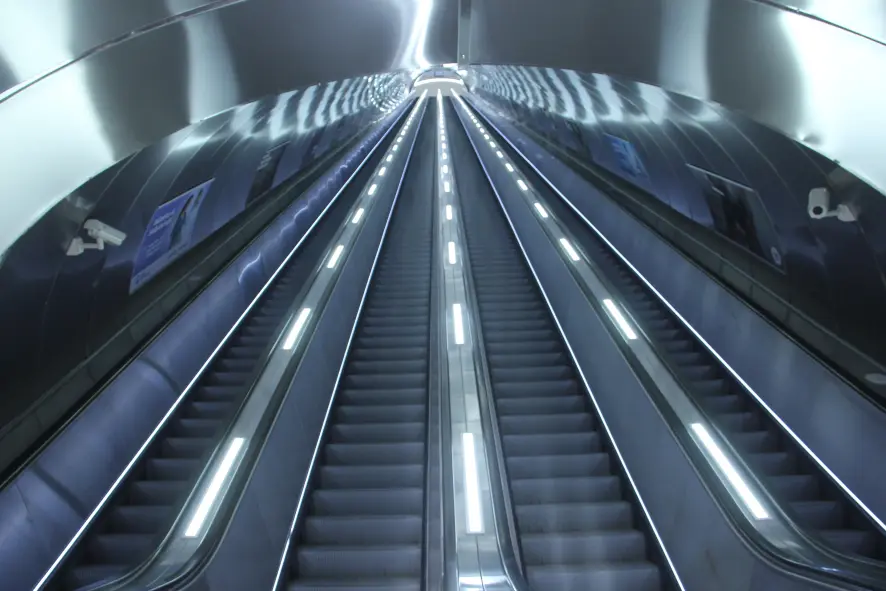Daily press, 2019-09-11, 10:30 AM
thyssenkrupp installs in Azerbaijan longest escalators ever produced in Germany
- thyssenkrupp giant escalators are longest in operation at 100 meters, bridging 48.7m in height and traveling half the earth’s circumference each year
- Escalators will help increase capacity of the metros station by 50 per cent and ensure efficient passenger flow of more than 231 million commuters per year

The longest escalators that thyssenkrupp Elevator has ever produced and that were ever built in Germany have gone now into operation in Azerbaijan. As an industry-first, the four Baku models will help revolutionize the ability of the metro stations to cope with increasing passenger numbers and bring the city in line with the modern-day transport demands of its 2.27 million population.
The four steel giants are narrower than any other solutions, without reducing the comfort and space that passengers are accustomed to. This is achieved by an innovative design and by installing the drive (motors and gears) on the floor in front of the escalator, rather than inside the escalator. This has enabled thyssenkrupp Elevator to install four units instead of three. As a result, more people are able to travel down to the platform or up to the concourse at the same time, increasing the capacity of the escalators in the shafts by as much as 50%.
Despite the speed of 0.75 meters per second, the sheer length of the escalators means that passengers in Baku will be travelling longer than, for example, someone in Germany who uses a standard escalator to get to the platform: the journey takes almost two and a half minutes. From the top you cannot even see the bottom of the escalators in the underground station in Baku, that's how deep it goes into the ground. The only thyssenkrupp escalators longer than that – bridging a height of 53 meters – have been manufactured for the Moscow Metro, but they have not yet been installed.
The commissioning follows the initial announcement thyssenkrupp made two years ago that it had won the public tenders of Baku Metro to supply 25 escalators within the next two years. The double-digit million contract includes eight high-rise escalators for Sahil and Khatai stations, as well as 17 escalators for a completely new metro station.
Helmut Brandl, CEO of thyssenkrupp Elevator’s Operating Unit Russia and Eastern Europe, said: “We’re extremely proud of the iconic installation and team behind the challenging but rewarding project for Baku metro. The sheer heights of the escalators involved posed a huge logistical challenge for our team, but our engineers and technicians took this on and delivered excellent results. We’re pleased to have played a role in helping to increase Baku’s metro stations’ capacity and ensure efficient passenger flow of more than 231 million commuters each and every year as part of its journey to become a leading future-proof city.”
The 100-meter escalators have been a significant challenge to install as parts had to be shipped more than 3,800 kilometres from Germany’s only escalator factory in Hamburg to Azerbaijan by 36 trucks. Each steel giant had to be disassembled and transported separately to the construction site. Because of the vast heights and weight of the parts involved, workers at the Hamburg escalator factory had to use a scaffold to climb up the individual components and to adjust parts of the escalator.
To give you an idea of the enormous structures the weight of each escalator is 75 tonnes – the equivalent of 50 Volkswagen Golf cars. And the length of the step chain of each of the four escalators is 1.7 km - longer than the swimming course of an Olympic triathlon.
The distance covered by each giant escalator will be 54 km per day – totalling approximately 19,700 kilometres per year which is about half the earth’s circumference. Each escalator will transport around 164,000 people each day – making the annual total just under 60 million passengers.
In addition to escalators, 307 elevators will also be installed to modernize public housing in Baku. This is the largest volume of thyssenkrupp Elevator Korea products to ever be exported.
Press images and a video of the Hamburg production site are available for download here.
Press images of the metro stations in Baku are available here.
About us:
thyssenkrupp Elevator
thyssenkrupp Elevator brings together the Group’s global activities in passenger transportation systems. With sales of €7.6 billion in fiscal 2017/2018 and customers in 150 countries, thyssenkrupp Elevator built its position as one of the world’s leading elevator companies from scratch in a mere 40 years’ time applying thyssenkrupp unique engineering capabilities. With more than 50,000 highly skilled employees, the company offers smart and innovative products and services designed to meet customers’ individual requirements. The portfolio includes passenger and freight elevators, escalators and moving walks, passenger boarding bridges, stair and platform lifts as well as tailored service solutions for all products. Over 1,000 locations around the world provide an extensive sales and service network to guarantee closeness to customers.
thyssenkrupp
thyssenkrupp is a technology group with traditional strengths in materials. Over 160,000 employees in 78 countries work with passion and technological know-how to develop high-quality products and intelligent industrial processes and services for sustainable progress. Their skills and commitment are the basis of our success. In fiscal year 2017/2018 thyssenkrupp generated sales of €42.7 billion.
Together with our customers we develop competitive solutions for future challenges in their respective industries. With our engineering expertise we enable our customers to gain an edge in the global market and manufacture innovative products in a cost- and resource-friendly way. Our technologies and innovations are the key to meeting diverse customer and market requirements around the world, growing on the markets of the future, and generating strong and stable earnings, cash flows and value growth.
 TK Elevator
TK Elevator

